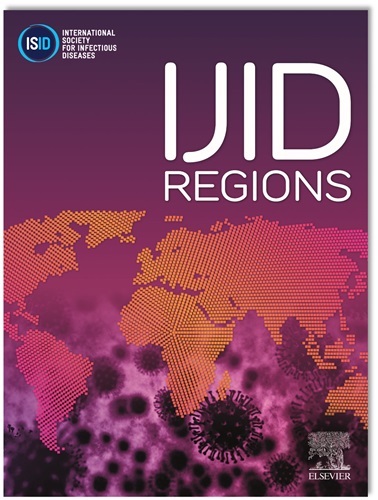VIDAS® TB-IGRA assay for diagnosing tuberculosis infection in people living with HIV: A preliminary study
IF 4.8
2区 医学
Q1 INFECTIOUS DISEASES
引用次数: 0
Abstract
Background
The diagnosis of presumed latent tuberculosis (TB) infection (LTBI) is problematic in people living with HIV (PLWH) because of sub-optimal sensitivity and high indeterminate rates, especially in those with advanced immunosuppression. Better diagnostic tools for LTBI are needed in this sub-population.
Methods
We compared the sensitivity of VIDAS TB-IGRA, a fully automated RD1-specific new interferon-ϒ-release assay (IGRA), to QFT-Plus in 77 PLWH with active pulmonary TB who had varying CD4 counts. Sputum culture positivity served as the reference standard for active TB.
Results
The sensitivity of VIDAS TB-IGRA was similar to QFT-Plus overall [90.9% (70/77) vs 92.0% (69/75)], in those with CD4 <200 cells/mm3, [88.9% (40/45) vs 88.6% (39/44)], and in those with CD4 <100 [85.7% (18/21) vs 80.0% (16/20)]. However, VIDAS TB-IGRA had a higher sensitivity in those with CD4 <50 [92.3% (12/13) vs 75% (9/12)] and fewer indeterminate results overall [0 vs 2]. When the indeterminate results in this subgroup were regarded as negative, the comparative sensitivity was [92.3% (12/13) vs 69.2% (9/13)].
Conclusion
VIDAS TB-IGRA had a similar sensitivity to QFT-Plus in PLWH. Whether VIDAS TB-IGRA sensitivity is significantly better at lower CD4 counts remains to be confirmed in a larger study. These data have implications for the diagnosis of LTBI in those with advanced immunosuppression.
用于诊断HIV感染者结核感染的VIDAS®TB-IGRA检测:初步研究
背景:在HIV感染者(PLWH)中,诊断推定潜伏性结核感染(LTBI)是一个问题,因为其灵敏度不佳,且不确定率高,特别是在晚期免疫抑制患者中。这一亚群需要更好的LTBI诊断工具。方法:我们比较了VIDAS®TB-IGRA(一种全自动rd1特异性新干扰素-ϒ-release检测(IGRA))对77例CD4计数不同的活动性肺结核患者QFT®-Plus的敏感性。痰培养阳性作为活动性结核的参考标准。结果:VIDAS®TB-IGRA的敏感性与QFT®-Plus总体相似[90.9%(70/77)对92.0%(69/75)],在CD4 3组中,[88.9%(40/45)对88.6%(39/44)],在CD4组中,结论:VIDAS®TB-IGRA与QFT®-Plus在PLWH中具有相似的敏感性。是否VIDAS®TB-IGRA敏感性在较低CD4计数下显着更好,仍有待于更大规模的研究证实。这些数据对晚期免疫抑制患者LTBI的诊断具有指导意义。
本文章由计算机程序翻译,如有差异,请以英文原文为准。
求助全文
约1分钟内获得全文
求助全文
来源期刊
CiteScore
18.90
自引率
2.40%
发文量
1020
审稿时长
30 days
期刊介绍:
International Journal of Infectious Diseases (IJID)
Publisher: International Society for Infectious Diseases
Publication Frequency: Monthly
Type: Peer-reviewed, Open Access
Scope:
Publishes original clinical and laboratory-based research.
Reports clinical trials, reviews, and some case reports.
Focuses on epidemiology, clinical diagnosis, treatment, and control of infectious diseases.
Emphasizes diseases common in under-resourced countries.

 求助内容:
求助内容: 应助结果提醒方式:
应助结果提醒方式:


